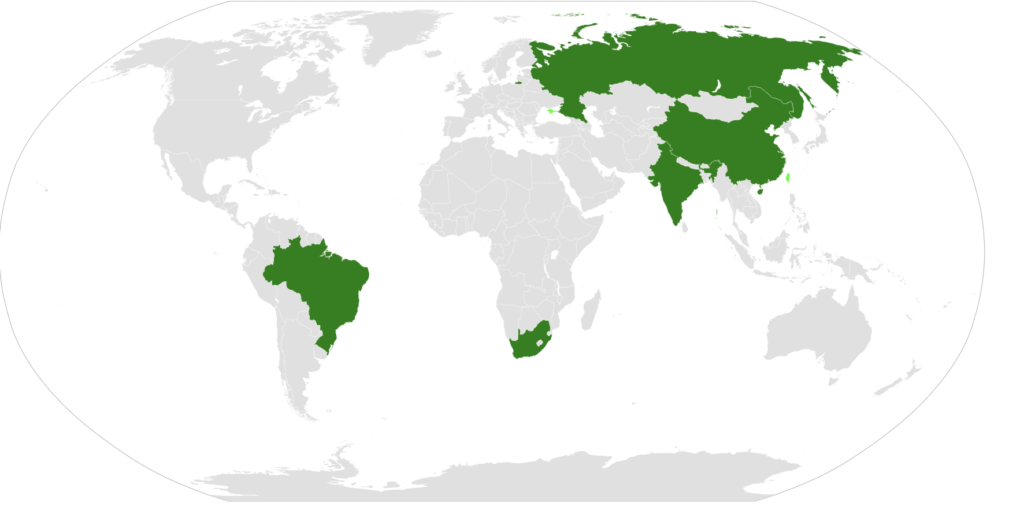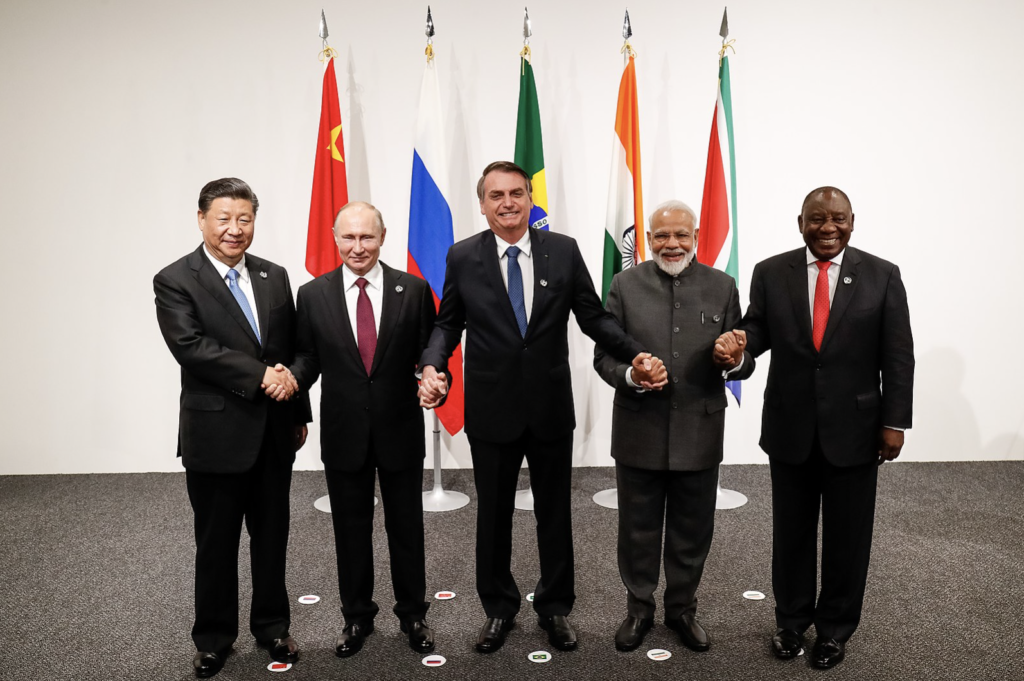Five Arab Nations Are Ready to Join BRICS

By: Adam Abdel-Qader / Arab America Contributing Writer
After the global financial crisis of 2008, BRICS, better known as Brazil, Russia, India, China, and South Africa, gained its reputation as one of the most powerful economic groupings in the world. Some claim that the grouping was established in retaliation against the Global North’s loss of financial and economic credibility after the 2008 financial crisis.
While these nations may not agree on wholesale ideological stances and governing tactics, they represent the Global South and developing nations economically and politically in many international affairs. Ever since BRICS’s establishment in 2009, it has hoisted itself as one of the most powerful entities in the global economy head to head with the US-led G7 economies.
Before the BRICS annual summit in August 2023, the original member nations will meet on June 2nd to discuss its expansion. The bloc has received requests from 19 potential new member nations expressing formal or informal interest in joining BRICS. Among these 19 countries lies five increasingly influential Arab nations, including Egypt, Algeria, Saudi Arabia, the United Arab Emirates, and Bahrain. Undoubtedly, five Arab nations joining BRICS will significantly shift the geopolitical alignment and economic cooperation between Arab and Western countries.

BRICS Growth Through the Years:
Since its inception, BRICS has been experiencing substantial growth year by year. The combined GDP of its member countries reached around $17-20 trillion at the start of the decade in 2020. Moreover, this bloc has become a vital force in global trade, accounting for 16 percent of world trade in 2020.
Interestingly, in 2020, BRICS and its G7 counterparts contributed equally percentage-wise to global economic growth; however, this will change by 2028 with projected Bloomberg statistics. While the G7 is anticipated to produce up to 28 percent of the worldwide economy, the BRICS bloc will likely make up 35 percent by 2028.
Although this growth speaks highly of the economic grouping, it has recently faced severe challenges. These challenges include a recent lag in economic development, intense intra-geopolitical tensions amongst BRICS actors, and extreme territorial conflicts outside the grouping.
Some past and current international challenges have discredited BRICS, including intra-geopolitical conflicts over borders and territorial disputes, such as border struggles between China and India or the Russia-Ukraine war ongoing since February 2022. While these examples do not detract from the bloc’s economic dominance and ability to influence economic and geopolitical alliances, they are still consequential and pathological behaviors that should be solved.
Anticipating New Arab Members:
The anticipated expansion of BRICS to include 19 new member nations, including the five influential Arab states, could mutually benefit the grouping and the new members. This opportunity will substantially increase economic opportunity in the MENA region and allow for beneficial and strategic trade between Arab states and some of the largest GDPs in the world. In regards to the five Arab nations, they have a combined population of over 206 million people and a combined GDP of 1.854 trillion dollars as of 2021, making them a vital and rather significant addition to BRICS nations.
At a time when the Global South and Developing nations of the world are projecting to join this bloc while more and more governments are turning their heads from the dollar, wealthy and influential Arab countries looking to make friends with BRICS is a pivotal move. This economic commitment is a significant shift in global affairs.
Implications on the West:
Traditionally, Arab nations have aligned their policy, economics, and politics with the West, specifically the United States. However, the merger of Arab countries into the economic powerhouse challenging the West could provide a permanent alternative economic and political alliance for Arab nations that would most likely change the balance of Western power in the Middle East and ultimately make it irrelevant and indefinitely challenged.
Furthermore, conjoining these Arab nations could dramatically affect the international oil market. Saudi Arabia, Algeria, and the UAE are all highly vital and influential oil-producing states with significant reserves and production capabilities of the resource. Including these players in BRICS could increase the group’s authority over the global oil market, which they have not directly possessed. Down the road, this could have riveting implications for global energy security.
Challenges of BRICS:
As many scholars point out, despite the addition of these 19 new member states having many potential benefits, there is also a fair share of challenges that must be addressed. One of these primary challenges is the diversity of the grouping in light of economic development and political systems. In simple terms, this can be exemplified by the fact that Brazil and India are democracies while Russia and China are autocracies. Similarly, while some potentially new member Arab nations like the UAE and Saudi Arabia are incredibly wealthy, other potentially new member nations asking to join may be impoverished or have different capacities and ideas regarding global trade.
Conclusion:
Overcoming these challenges will require new member nations to establish common goals and priorities. It looks as if the current and commonly installed goal of BRICS is to represent and hold the preferences of the Global South on a pedestal and actively challenge the West’s global order in multilateral forums.
The future of the BRICS is still up for question after Egypt, Bahrain, Saudi Arabia, Algeria, the UAE, and the other 14 potential new members join the bloc. But one central question remains: Where do the West and the dollar fit into the BRICS economic equation?
Check out Arab America’s blog here!








